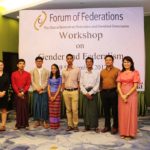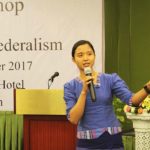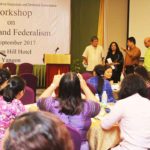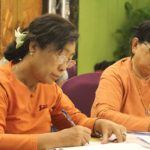On September 8th and 9th, Forum of Federations brought together representatives from political, social, and academic fields to explore the question of gender and how the country could improve the inclusion of women and sexual minorities within a federal system.
This workshop forms part of the Forum’s Myanmar federalism capacity program funded by Global Affairs Canada.
The fight for women’s rights has long been a struggle in Myanmar. Despite the signing of the CEDAW in 1997, institutional and traditional barriers continue to create challenges for women to reach their full potential, such as limited access to proper education and healthcare. Constitutionally, women and sexual minorities lack protection against discrimination and the ability to obtain high levels of political office. These issues, among others, were at the forefront of a two-day Workshop on Gender and Federalism held in Yangon.
The implementation of a federal system and the decentralization of power have the potential to contribute directly to the empowerment of women and the capacity to address women’s issues, so the message of the Forum’s international workshop facilitators. Regional and local governments could provide an easier platform from which to deliver gender specific services when they are in need, and the likelihood of those services having a positive impact could be higher than if they were delivered by a central source. Decentralizing power means reimagining traditional institutional structures to make space for greater representation within all levels of government and to understand the importance of policies and legislation written by women, for women. Perhaps the most fundamental element that federalism potentially bring to the push for gender equality is its reliance on diversity, a topic of great interest and importance to the 75 participants who attended the event.
“Federalism allows for diversity to be represented,” said Professor Sandeep Shastri, a senior advisor to the Forum, “and experience has shown that when women are involved in diversity issues, they are able to negotiate and present diversity issues in a more acceptable way to society.” Professors Shastri, Priyanca Velath and Francis Koh-Wah Loh conducted the workshops over the two-day period, addressing everything from the proper terms to use when discussing decentralization to the human rights needs of women in Myanmar.
In total, 17 government and non-government organizations were represented during the event, including LGBT+ advocacy and support groups, university academics, ethnic minority organizations, and political parties. The workshop was jointly organized by the Alliance for Gender Inclusion in the Peace Process (AGIPP). Forum welcomed many distinguished guests, including Daw May Win Myint, chairwoman of Central Women Working Committee of the ruling National League for Democracy (NLD) party and the vice chairwoman of NLD Mandalay Region, Daw Win Mya Mya. Mi Kun Chan Nun, chairwoman of the AGIPP, was also present, as was the leader of the Rakhine Women Union, Ma Saw Thiri Yimon, among other prominent leaders.
The range of social and ethnic representation at the event demonstrates that celebrating diversity and encouraging collaborative engagement between all parties is understood to be the ideal method of achieving democratization and decentralization.
Both during workshop sessions and through private interviews, participants attested to the tremendous barriers they have overcome to hold the positions they do today; their stories were inspiring and their visions for the potential of women and LGBT+ individuals in the country were hopeful.
“Federalism reflects democratic practices, like equal rights and the inclusion of women in politics” said one participant. She noted that the 2008 Constitution must be amended to better address questions of equality and individual policies for minority groups.
A representative from the LGBT+ community said that in the future she hoped at least 1% of decision making power in the country would be in the hands of sexual minorities. She believes that federalism can be crucial to the empowerment of the LGBT+ community because of its foundation of equality.
“Women are too traumatized to use their voice,” asserted a participant with 16 years of experience working in development; she added that equality, equity, and information sharing would be the tools to overcome this problem of long term suffering. Federalism, she said, can help divide services to minority ethnic groups and shape a strategy of nation building.
When asked what could be done in Myanmar to improve gender equality, participants answered that advocacy, capacity building, and public awareness should be made priorities.
Overall, the two-day workshop offered a positive, collaborative environment for participants to discuss the future of gender diversity and federalism in Myanmar. “We’ve never had so many questions and not enough time to answer them” said Professor Shastri, pleasantly surprised by the level of participation.
The Forum’s country representative, U Htet Min Lwin, pointed out that the belief that women don’t face discrimination in the country is a misconception. “In the federal system,” he said, “there is more space for women to participate. My expectation is for regional governments to create a quota system for women and to acknowledge that discrimination against women does exist.”
“This was the first workshop we’ve held that deals specifically with the subject of gender and federalism,” remarked Forum of Federation’s Vice-President Felix Knüpling. While addressing the participants, he said, “seeing everyone here, sharing their stories and experiences, is an example of positive change happening in the country.” Mr. Knüpling said that the Forum was planning further capacity building for women on federalism and workshops on the nexus between gender and federalism. He expressed the ambition to ensure higher participation of men at these events to ensure that the issue of gender equality is made a priority by all stakeholders in the country.




Forum News

